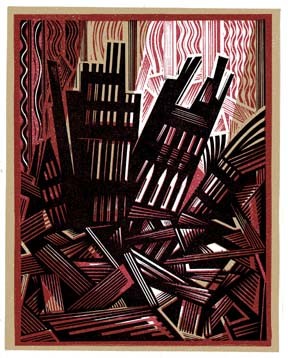RELIGION IN THE NEWS |
||
| Table
of Contents Fall 2001
Quick Links:
On the Beat: Covering Religion in Hard Times Letter to the Editor and Reply
|
From the Editor: The Civil Religion Goes to War by Mark Silk
He spoke of grief for the people who died, of the heroes who had given their lives to rescue others, of the prayers and candlelight vigils and displays of American flags that were taking place around the country. He asked God to watch over America and to grant its citizens patience and resolve and comfort and consolation. And, towards the end, he declared that Americans now had the responsibility "to answer these attacks and rid the world of evil." This did not sit well with Robert Bellah, emeritus professor of sociology at the University of California at Berkeley. "It was a stunningly inappropriate talk by Bush, basically because it was a war talk," Bellah told Bill Broadway of the Washington Post. "What was it doing there?" That is a curious comment coming from the scholar whose 1967 essay, "Civil Religion in America" provoked an academic cottage industry on religion and national identity. If civil religion is about anything, it’s about war and those who die in it. When Lincoln went to the Gettysburg battlefield to dedicate a cemetery for the fallen he delivered a war talk, calling on the living to "take increased devotion to that cause for which they gave the last full measure of devotion" and to resolve "that these dead shall not have died in vain—that this nation, under God, shall have a new birth of freedom." It may have been that Bellah objected not to what Bush said but to his saying it in a church rather than on a battlefield or the steps of the Capitol—but I don’t think so. Whatever unhappiness we may feel about conducting Caesar’s business in God’s house, the problem here had to do with how the civil religious rhetoric was laid on. A presidential call for Americans to rid the world of evil has an element of spiritual presumption that would not have sat well wherever it was issued. Nor was it only to Muslims that the administration’s original name for the Afghanistan campaign, Infinite Justice, gave offense. In his Second Inaugural Address, Lincoln was circumspect in suggesting that God was committed to the Union’s cause: "Fondly do we hope—fervently do we pray—that this mighty scourge of war may speedily pass away. Yet, if God wills that it continue, until all the wealth piled by the bond-man’s two hundred and fifty years of unrequited toil shall be sunk, and until every drop of blood drawn with the lash, shall be paid by another drawn with the sword, as was said three thousand years ago, so still it must be said, ‘the judgments of the Lord are true and righteous altogether.’" In his September 20 speech to a joint session of Congress, George W. Bush managed language that, if it was not Lincolnesque, at least took some care in identifying where God stood: "The course of this conflict is not known, yet its outcome is certain. Freedom and fear, justice and cruelty, have always been at war. And we know that God is not neutral between them." The speech was received well. When a new chapter opens in the story of religion in American public life, it takes some adjustment of word and deed. After World War II, the "Judeo-Christian tradition" came into general use to define a common American religious faith against the godless Communist enemy. But because we understand today that America is not just Protestants, Catholics, and Jews, we have now mounted an ecumenical enterprise that includes the others—most especially the Muslims. The hundreds of post-September 11 memorial services that took place across America were, among other things, displays of religious pluralism. I would not presume to say that this amounts, as Robert Bellah wrote in his famous essay, to "a genuine apprehension of universal and transcendent religious reality as seen in or, one could almost say, as revealed through the experience of the American people." But the readiness of Americans, from inside the Beltway to the hinterlands, to incorporate a diversity of faiths into their public ceremonies has been impressive. Whether such inclusive religiosity can persuasively be marshaled against an enemy that thinks of itself as supremely godly is another question altogether.
|
|
 On September 14, President Bush went to Washington’s National
Cathedral, that monument to Episcopalian establishmentarianism, to offer
remarks at a prayer service for the victims of the September 11 attacks.
On September 14, President Bush went to Washington’s National
Cathedral, that monument to Episcopalian establishmentarianism, to offer
remarks at a prayer service for the victims of the September 11 attacks.